In this article, we’re diving into the world of Synology NAS models, especially those perfect for multimedia and file sync. First, we’ll break down the criteria to consider when choosing the right hardware, depending on where and how you plan to use it.
As we go through the article, we’ll take a close look at specific models like the DS224+ and DS723+. We’ll give you the lowdown on their features, prices, and how well they fit different needs. Additionally, each section shows the pros & cons, and unique features that differentiate each model.
Without further ado, let’s begin…
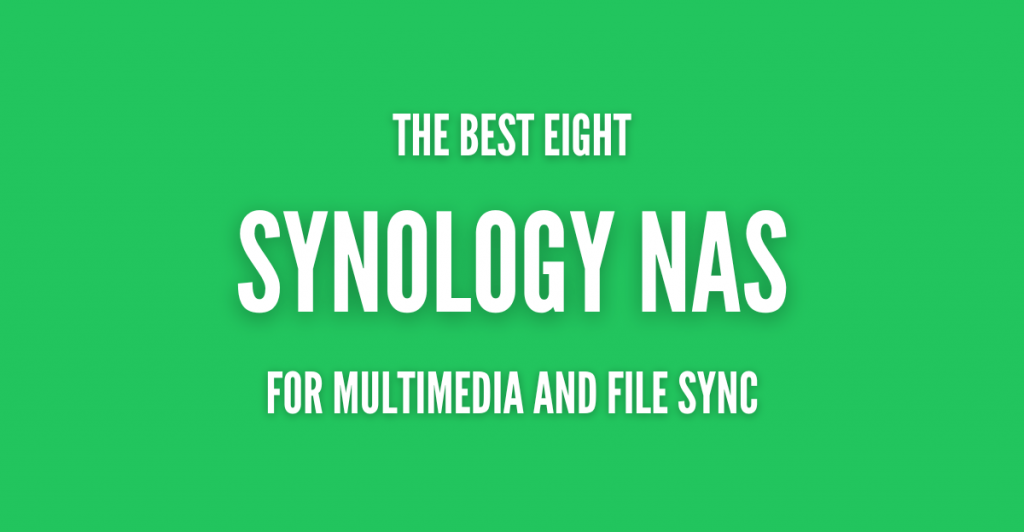
So, what are the best 8 Synology NAS for multimedia and file synchronization?
- Synology DiskStation DS224+
- Synology DiskStation DS723+
- Synology DiskStation DS1522+
- Synology DiskStation DS923+
- Synology DiskStation DS920+
- Synology DiskStation DS1621+
- Synology DiskStation DS1821+
- Synology DiskStation DS1819+
Criteria for Selecting the Best Synology NAS Hardware
When choosing a Synology NAS (Network Attached Storage), consider your specific needs, whether the NAS will be for your home, small office, business, or enterprise environment. Knowing this will make a big difference. Also, there are several key factors that you must consider to make sure you make a good buying decision:
a. Type of Environment
- Home or Small Office: Typically requires less intensive hardware capabilities. Key uses may include file storage and synchronization, data backup, and serving as a multimedia hub.
- Business or Enterprise: Demands more robust hardware for handling larger volumes of data, multiple users, advanced virtualization storage, and more complex applications.
Want to know how to set up Plex Media Server on your Synology NAS? Check our comprehensive guide “Setting Plex on Synology NAS” which will teach you everything, from pre-requisites, and installation, to troubleshooting.
b. Intended Applications
Aside from building a multimedia hub or using your Synology NAS for file server and synchronization, there are in fact, many uses for a NAS. For example:
- Home or Small Office Applications:
- File Server & Synchronization: Access and sync files across various platforms easily.
- Data Backup: Protect data from various devices directly to the NAS.
- Multimedia Hub: Manage and distribute multimedia content via an intuitive interface.
- Productivity Applications: Manage documents and real-time communication.
- Virtual Machines: Host virtual machines directly on the NAS for varied applications.
- Business or Enterprise Applications:
- Advanced File Server & Synchronization: Enhanced capabilities for seamless file sharing across operating systems.
- Data Backup for Business: Comprehensive solutions for backing up critical business and virtual machine data.
- Storage for Virtualization: Utilize the NAS as a storage component in a larger virtualization infrastructure.
- Collaboration Tools: Support for document editing and synchronization across teams.
- Mail Services: Implement a secure and reliable private mail server.
- Virtual Machine Clusters: Support for creating and managing VM clusters with capabilities for load balancing and resource allocation.
c. Demand Assessment
Determine how many users and devices will be connected to the NAS. Knowing this will help you select a Synology NAS model that handles the expected load without hurting performance.
d. Additional Features
- Consider extra features that may be beneficial:
- Expandability: Options for adding more storage or upgrading hardware components.
- Energy Efficiency: It is important to reduce running costs, especially in 24/7 operations.
- Security Features: Advanced security measures such as encryption, two-factor authentication, and regular software updates.
- User Interface and Accessibility: Ease of use through a user-friendly interface can significantly enhance user satisfaction and reduce maintenance time.
e. Think outside the box.
If you would like to take your multimedia or file server to a whole new level, consider a Seedbox. A Seedbox is basically a VPS or dedicated server built for torrenting and streaming. With a seedbox, you’ll get the benefits of the cloud (that on-premise NAS can’t give).
- Increased Bandwidth and Speeds: Seedboxes provide exceptional high bandwidth. This will help you enhance upload speeds and streaming quality beyond the typical home internet limits.
- Enhanced Privacy and Security: Seedboxes mask your IP address (much like VPNs or proxies). This feature offers additional privacy, especially useful for torrenting or P2P activities, where home NAS might expose you to ISP scrutiny.
- Accessibility and Reliability: Seedboxes ensure media and files are accessible globally. This means you are 100% independent of home network reliability. This is ideal if you travel or share with others remotely and upstream connectivity to your home-based NAS isn’t enough.
- Cost-Effectiveness for Expansion: Expanding Synology NAS storage is costly. On the other hand, seedboxes offer additional, potentially cheaper remote storage without needing the physical space.
- Offsite Backup: A seedbox can serve as an extra backup layer. This is crucial when local NAS data is lost, ensuring important media files are preserved.
- Ease of Use and Setup: Seedboxes come with user-friendly interfaces and support. They require less technical maintenance compared to the more hands-on Synology NAS setup and upkeep.
Expand Your Synology NAS Capabilities with a Seedbox
With RapidSeedbox you get:
Fast downloads
Privacy with dedicated IPs
Smooth media streaming
Remote file access
1. Synology DiskStation DS224+ (Best value for home users)
The Synology DS224+ is an entry-level 2-bay NAS. This product is designed for simple data management and home entertainment. It comes with a quad-core processor and supports snapshot technology for data protection.
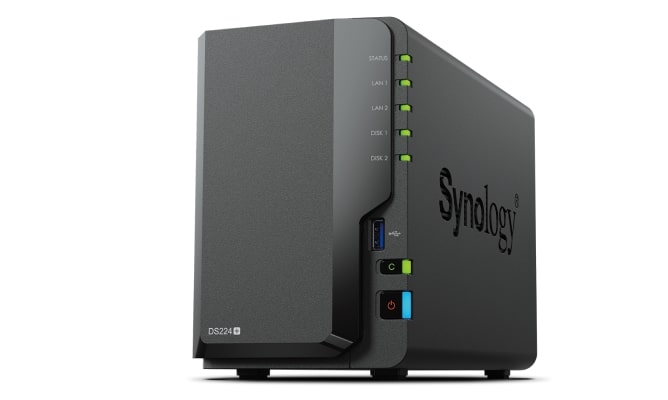
- Price: Around $300.
| Pros | Cons |
| Affordable with a solid feature set. | Similar to its predecessor, DS220+. |
| Quad-core Intel Celeron processor boosts performance. | Limited default RAM, may require upgrades. |
| Compact and easily integrated into home networks. | It is not suitable for demanding enterprise tasks. |
- Why do we recommend it? The Synology DS224+ provides significant performance for a low cost. This NAS is ideal for home users who stream media or perform light office tasks. However, you might have to look somewhere else if you need more intensive processing power or larger storage scalability.
- Who do we recommend it for? This piece of hardware is perfect for budget-conscious home users or “first-time” NAS buyers.
- What is a unique quality/feature? The Synology DS224+ strikes an excellent balance between cost and performance. This makes it a great entry point into the world of NAS.
2. Synology DiskStation DS723+ (Best compact power for small workspaces).
The Synology DS723+ NAS is a compact piece of hardware with powerful data management capabilities. It is ideal for small offices and professional users. The hardware comes with dual M.2 SSD slots for caching and can be expanded to 7 drive bays with a DX517 unit.
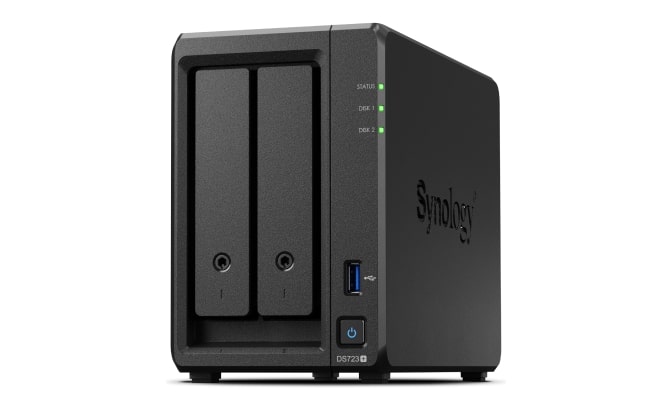
- Price: Approximately $500.
| Pros | Cons |
| Fast dual-core Ryzen processor for demanding applications. | Only 2GB of RAM, may need upgrades for intensive tasks. |
| Expandable storage with support for additional units. | Lacks integrated GPU. So it is not ideal for heavy media transcoding. |
| Compact size fits in small spaces. | It starts with only two drive-bays. So, it may be insufficient for high storage needs. |
- Why do we recommend it? The Synology DiskStation DS723+ offers high performance in a compact form. We recommend this NAS if you have limited space but still need powerful computing capabilities. However, remember that it may not be the best if you require extensive video transcoding capabilities.
- Who do we recommend it for? We recommend Synology DiskStation DS723+ for freelancers, individual professionals, and small office setups. It is ideal if you are in this niche and looking for a powerful, compact NAS that takes less space.
- What is a unique quality/feature? Despite its compact size, it still offers powerful performance with Ryzen processors and can handle demanding applications.
3. Synology DiskStation DS1522+ (Best for small businesses and tech-savvy users)
The DS1522+ is an impressive NAS storage system made just for small businesses and tech geeks. It comes with 4 Ethernet ports and can hold up to 15 hard drives (if you add two more expansion units.)
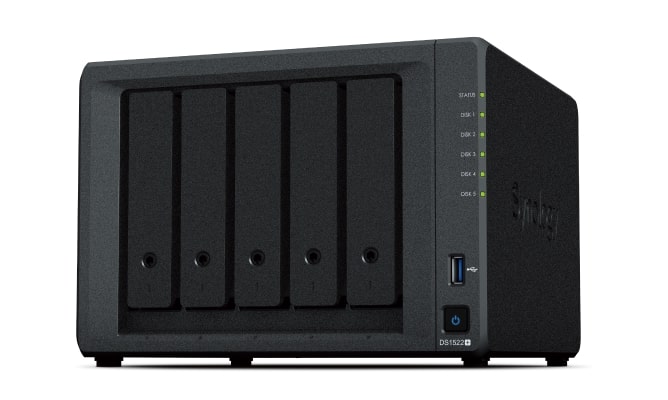
- Price: About $700
| Pros | Cons |
| Fast AMD processor. It handles demanding tasks. | It lacks on-the-fly video transcoding. |
| Upgradable RAM and network ports for future scalability. | It needs a proprietary adapter for 10GbE upgrades. |
| Generous expansion capabilities with ample drive bays. | It is pricier than the basic models. Plus, it is potentially excessive for casual use. |
- Why do we recommend it? The DS1522+ offers a solid balance of performance, scalability, and features at a mid-range price. This “balance” makes it suitable for a wide range of uses from home offices to small businesses. However, we would not recommend it if you need it primarily for media streaming that requires on-the-fly transcoding, or if the budget is constrained.
- Who do we recommend it for? We strongly agree that DS1522+ is ideal for small business owners, prosumers, and tech enthusiasts. It is perfect for those who need robust performance and the option to expand.
- What is a unique quality/feature? A unique feature of this Synlogy NAS is network scalability. With this feature, you can easily switch up to a 10GbE connection if you need more speed in the future.
4. Synology DiskStation DS923+ (Best for homes and small businesses looking for scalability.)
The Synology DS923+ is an advanced 4-bay NAS. This device is designed for small to medium-sized businesses. Plus, the NAS comes with a powerful AMD Ryzen processor and integrated graphics for smooth multimedia handling.
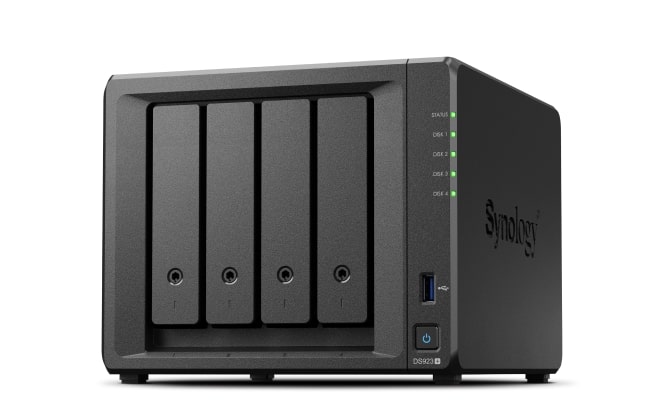
- Price: Roughly $600
| Pros | Cons |
| Top performance with AMD Ryzen R1600 processor. | No integrated GPU. This limits video transcoding capabilities. |
| Supports up to 32GB of RAM for demanding tasks. | It comes with 1GbE ports, potentially needing upgrades for faster speeds. |
| The NVMe storage drives enhance processing speed and efficiency. | It is pricier than entry-level models. It may not be a fit for all budgets. |
- Why do we recommend it? The Synology DS923+ combines power and scalability in a mid-tier model. We recommend it for a broad range of applications from business to advanced home use. However, we don’t think the NAS is ideal if budget is a concern or if the specific use case requires on-the-fly video transcoding without additional hardware.
- Who do we recommend it for? We recommend this device for small businesses and tech-savvy home users It is perfect for those looking for a robust NAS with the flexibility to handle complex tasks and future scalability.
- What is a unique quality/feature? The use of NVMe drives for storage rather than just caching is quite impressive. This feature speeds up data access dramatically.
5. Synology DiskStation DS920+ (Best for streaming solutions)
The DS920+ is a Synology NAS designed for homes and small offices. It is equipped with an Intel quad-core processor and 4GB DDR4 memory. So, it offers an excellent performance for data synchronization and multimedia processing.
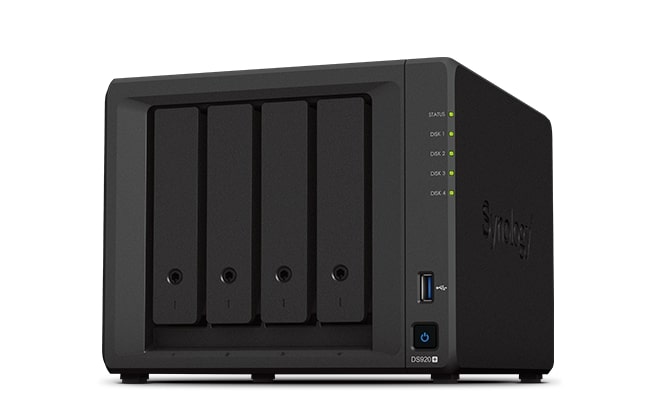
- Price: Around $550
| Pros | Cons |
| Excels at media transcoding and streaming. It is ideal for Plex. | It features only dual Gigabit Ethernet ports. It lacks faster multi-gig options. |
| It supports diverse applications, including virtual machines, using Docker and DSM. | It comes with 4GB RAM, potentially needing upgrades for heavy use. |
| It features two M.2 slots for SSD caching and easy memory upgrades. | Vented design aids cooling but requires frequent dust cleaning. |
- Why do we recommend it? We recommend the DS920+ to balance multimedia handling and data management capabilities. This device supports SSD caching and can also handle multiple tasks simultaneously. So this, makes it a great choice for advanced home users and businesses. However, we would not recommend it, if your requirements include ultra-fast network speeds or vast storage.
- Who do we recommend it for? This device is perfect for tech enthusiasts, small to medium-sized business owners, and media buffs. It is ideal for anyone needing a reliable NAS for streaming, data storage, or running various applications.
- What is a unique quality/feature? The DS920+ stands out for its performance in media streaming and its user-friendly interface. This quality makes it a great choice for users who want both simplicity and power.
6. Synology DiskStation DS1621+ (Best for high-performance tasks and advanced users.)
The DS1621+ is a Synology NAS delivering high performance and robust data protection. It comes with an impressive AMD Ryzen quad-core processor and up to six drives for flexible storage scalability.
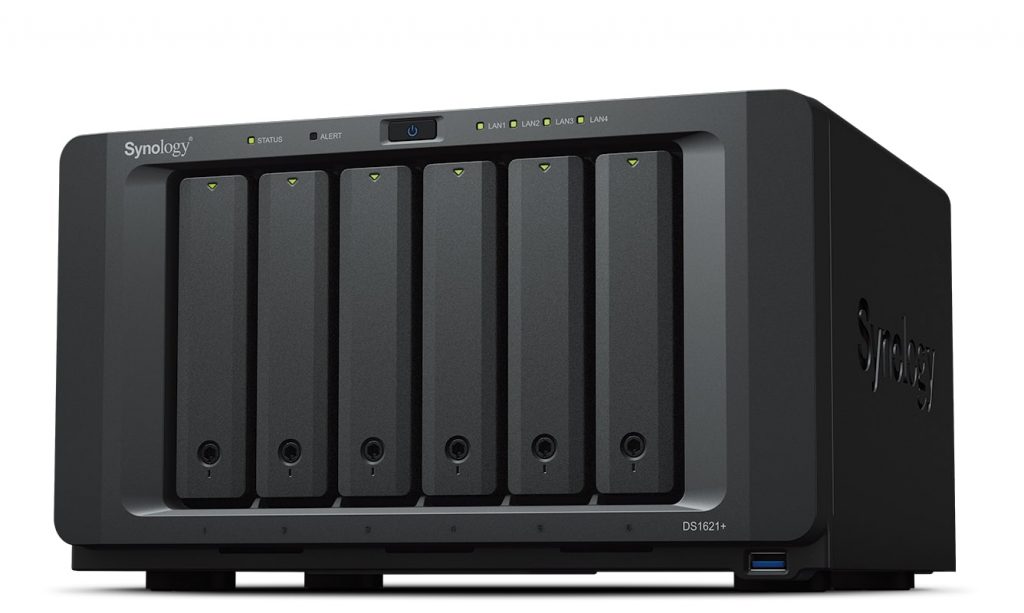
- Price: About $800
| Pros | Cons |
| It features a fast and reliable AMD Ryzen quad-core 2.2 GHz processor. | It comes with only 4GB of RAM. This often leads to immediate upgrades. |
| It expands up to 16 drives with options for two additional expansion units. | Includes only a 1GbE LAN port, potentially needing an upgrade. |
| Supports easy upgrades with PCIe accessories and M.2 NVMe slots for SSD caching. | Its advanced features and larger form factor may not suit basic needs or small spaces. |
- Why do we recommend it? We recommend the DS1621+ for its exceptional processing power and scalability. However, we wouldn’t recommend this device for its high cost and over-specification for users who need a NAS for basic storage and streaming. Additionally, it is not ideal for those on a tight budget.
- Who do we recommend it for? We recommend the DS1621+ to large businesses, IT professionals, and users needing high performance. Additionally, it is ideal for demanding applications like multi-cam surveillance and running virtual machines.
- What is a unique quality/feature? The unique feature of this device is its robust quad-core Ryzen processor and the ability to host extensive virtual environments.
7. Synology DiskStation DS1821+ (Best for heavy multimedia environments)
The Synology DS1821+ is an 8-bay NAS designed for SMB customers. It is perfect for those looking for a powerful and scalable storage solution. The NAS comes with a quad-core 2.1 GHz processor and can scale up to 18 drives.
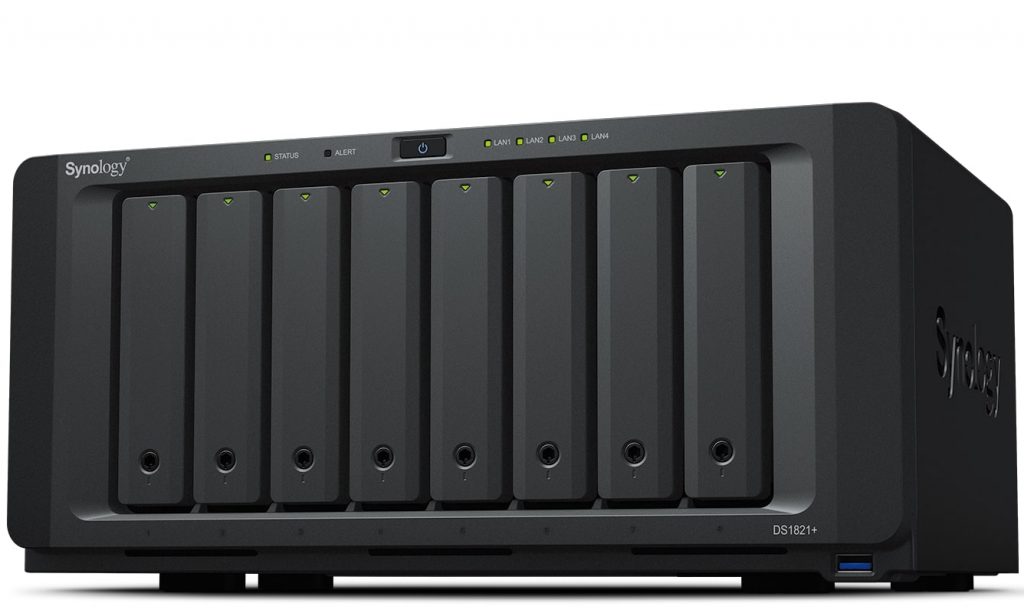
- Price: Approximately $950
| Pros | Cons |
| High scalability with up to 18 drive bays | Higher price point due to advanced features. |
| Quad-core 2.2 GHz processor ensures robust performance for multitasking. | Larger sizes may not be suitable for very limited space environments. |
| Built-in M.2 NVMe slots for SSD cache enhance file access and synchronization speed. | Over-specification for users with minimal data storage needs. |
- Why do we recommend it? We recommend DS1821+ for environments that need high storage capacity, such as multimedia applications and file synchronization. However, bear in mind that this NAS solution is not cost-effective for users who need basic capabilities. So, if you need simple storage or backup with minimal performance requirements look somewhere else.
- Who do we recommend it for? We recommend DS1821+ for SMBs or tech-savvy home users needing a powerful storage solution that can grow with their needs.
- What is a unique quality/feature? A unique feature of this NAS device is its ability to scale up to 18 drives. This quality offers significant expansion potential, making it a future-proof investment for growing needs.
8. Synology DiskStation DS1819+ (Best for medium businesses)
The Synology DS1819+ is a NAS solution designed for SMBs needing scalability and performance. It features an Intel quad-core 2.1 GHz processor and is expandable to 18 drive bays.
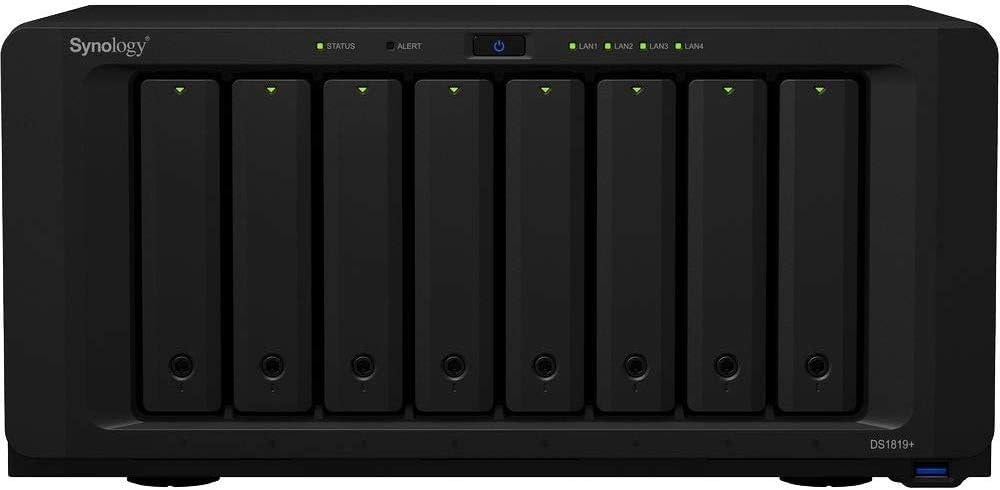
- Price: Around $950
| Pros | Cons |
| Intel quad-core 2.1 GHz processor for intensive tasks. | Comes at a high price due to advanced features. |
| It expands to 18 drive bays, up to 216 TB, suitable for growing needs. | It requires technical knowledge due to complexity. |
| Includes four Gigabit Ethernet ports and a PCIe slot. | Needs regular cleaning to prevent dust buildup. |
- Why do we recommend it? We recommend the DS1819+ for SMBs looking for a NAS with high performance and the ability to scale. The NAS solution supports various backup and cloud synchronization options, making it a central piece for comprehensive data management strategies. However, we would not recommend this solution for individuals or businesses with modest storage needs or those on a tight budget. For these use cases, the DS1819+ might be overkill.
- Who do we recommend it for? The DS1819+ is ideal for SMBs and SMEs needing a powerful and scalable storage solution. It’s also suitable for IT environments where data redundancy and network performance are critical.
- What is a unique quality/feature? The DS1819+ stands out with its ability to handle intensive storage tasks while providing options for significant expansion and upgrade.
Best Synology NAS – Final Verdict
Choosing the right Synology NAS can make all the difference between having a media server that works and one that doesn’t. But choosing one can be difficult, especially when considering needs like performance, budget, and future scalability.
After checking the Synology models discussed in the article, here’s our final verdict:
Best NAS for Multimedia and File Synchronization? Synology DiskStation DS920+. The DS920+ offers robust performance for media transcoding, streaming, and file synchronization.
Best Value for Money? Synology DiskStation DS224+. This solution offers the best value for money, especially for users new to NAS devices or with modest storage needs.
So what’s the information here? I have a seedbox. I have multiple Synology units. Other than storing the items that I download with my seedbox, what are you suggesting I do?
Hi John, I believe this article is simply recommending various Synology NAS models. If you’re interested in the various uses of your NAS you can consider that various applications that can be operated from it. For example, backup software, creating private cloud storage, streaming media with Plex or Jellyfin, and so on. Personally, I tend to use mine primarily for backups and streaming with Plex.